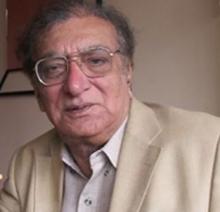Abhi kuch aur karishmay ghazal ke dekhte hain, Faraz ab zara lehja badal ke dekhte hain,
Judaeyaan tau muqaddar hain phir bhi ay jaan-e-safar, Kuch aur door zara saath chal ke dekhte hain,
Rah-e-wafa mein hareef-e-kharaam koi to ho, Sau apne aap se aagay nikal ke dekhte hain,
Tu samnay hai tau phir kyon yaqeen nahi aata, Yeh baar baar jo aankhon ko mall ke dekhte hain,
Yeh kaun log hain moujood teri mehfil mein, Jo lalichoon se tujhe, mujh ko jall ke dekhte hain,
Yeh qurb kya hai ke yakjaan huye na door huye, Hazaar aik hi qaalib mein dhall ke dekhte hain,
Na tujh ko maat huyi hai na mujh ko maat huyi, Sau ab ke dono hi chaalen badal ke dekhte hain,
Yeh kaun hai sar-e-saahil ke doobnay walay, Samundaroon ki taho’n se ucchal ke dekhte hain,
Abhi talak tau na kundan huye na raakh huye, Hum apni aag mein har roz jal ke dekhte hain,
Bohat dinon se nahi hai kuch us ki kher khabar, Chalo Faraz kuu-e-yaar chal ke dekhte hain…

Ahmad Faraz, the name that resonates with poetry enthusiasts, stands as a towering figure in the realm of Urdu literature. Born as Syed Ahmad Shah in Kohat, British India, on January 12, 1931, Faraz became one of the most celebrated and beloved poets of his time. His profound words, rich metaphors, and poignant expressions captured the hearts and minds of countless readers, cementing his legacy as a master poet.
Faraz's poetry is characterized by its depth, intensity, and the ability to touch the deepest recesses of the human soul. His verses delve into themes of love, loss, longing, revolution, and social justice, reflecting the trials and tribulations of the society he lived in. Faraz possessed an uncanny talent for weaving together words that evoked strong emotions, often stirring a sense of longing, melancholy, or hope within his readers.
One of the distinctive aspects of Faraz's poetry is his mastery of the ghazal form. He revitalized this traditional poetic form, infusing it with his unique style and contemporary sensibilities. His ghazals are replete with captivating imagery, thought-provoking symbolism, and a lyrical quality that sets them apart. Faraz had an innate ability to capture the nuances of human relationships, particularly the bittersweet nature of love, with remarkable finesse.
Throughout his poetic journey, Faraz remained a voice of dissent and resistance. His verses became a powerful medium to criticize social and political injustices, and he fearlessly confronted the prevailing power structures of his time. He spoke for the downtrodden, the marginalized, and the voiceless, embodying the spirit of a true poet-activist.
Faraz's poetry not only resonated within the confines of his native Pakistan but transcended borders, touching the hearts of Urdu poetry enthusiasts worldwide. His words became an integral part of the cultural fabric, inspiring generations and leaving an indelible mark on the literary landscape.
Ahmad Faraz breathed his last on August 25, 2008, leaving behind a rich body of work that continues to inspire and captivate readers to this day. His verses remind us of the power of words, the beauty of language, and the profound impact that poetry can have on society.
In the realm of Urdu poetry, Ahmad Faraz's name shines like a radiant star, forever illuminating the hearts of those who seek solace, inspiration, and an unfiltered expression of the human experience. His legacy remains an eternal testament to the enduring power of poetry to touch the very core of our existence.
Dil munaafiq tha, shab-e-hijr mein soya kese, Aur jab tujh se mila, toot ke roya kese..
Pyar bhi karna, zamaney se bhi ghabrana bohat, Aayino’n ka ghar banana aur pathar sochna…
Agarche zor hawaaon ne daal rakha hai,
Magar charaagh ne lau ko sambhaal rakha hai,
Mohabton main to milna hai ya ujad jaana,
Mizaaj-e-ishq main kab etidaal rakha hai,
Bhale dinon ka bharosa hi kya rahen na rahe,
So maine rishta-e-gham ko bahaal rakha hai,
Bhari bahaar main ik shaakh pr khilaa hai gulaab,
Ke jaise tu ne hatheli pe gaal rakha hai,
Faraz ishq ki duniya to khuubsurat thi,
Yeh kis ne fitna e hijr o visaal rakha hai..
Ro parra hoon to koi baat hi aesi ho gi, Main ke waqif tha tere hijr ke adaab se bhi..
Har waqt ka hasnaa tujhe barbaad na kar de, Tanhaayi ke lamhon mein kabhi ro bhi liya kar,
Aye dil! tujhe dushman ki bhi pehchaan kahan, Tu halqa-e-yaraan* mein bhi mohtaat* raha kar..
(halqa-e-yaraan;around friends, mohtaar;cautious)
Yun phir raha hai kaanch ka peiker liye howey Ghafil ko yeh gumaan hai ke pathar na aye ga
Us ki aankhon ko kabhi ghaur se dekha hai Faraz, Roney walon ki taraaah jaagney waalon jesi..
Ab tere zikr pe hum baat badal dete hain, Kitni raghbat* thi tere naam se pehle pehle..
(raghbat;attraction)
Aansu`oon ki Tarah Nazron say Giraya Us Ne Apni khabar Na Mili Kuch Aise khak Mein Milaya Us Ne,
Elzaam Mujh Pe Lagaaya Magar Bewafa khud Tha Pehle Dewana Banaya Phir Mujhey Thukraya Us Ne,
Usko Mazaa Aata Hai Mujhko Sataane Mein Mujhe Geeli Lakri ki Tarah Jalaya Us Ne,
Aaya Na Tha Us ko Wadaa Wafaa Karnaa Logon ko Jhota Apni Wafa ka Qisa Sunaya Us Ne,
Tanhayon K Dard Se khoob Waqif Tha Woh “FARAZ” Pher Bhi Dunya Mein Mujhe TANHA Baanaya Us Ne.
